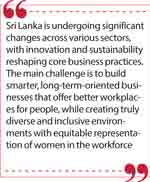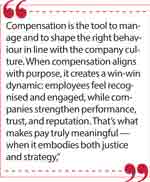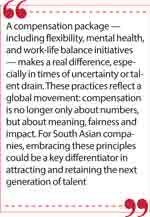Tuesday Feb 17, 2026
Tuesday Feb 17, 2026
Wednesday, 26 November 2025 00:00 - - {{hitsCtrl.values.hits}}

Acara Reward and Benefits Founder and Responsible Compensation Consultant Nimesha Kariyawasam
France-based Responsible Compensation Consultant and Founder of Acara Reward and Benefits- Nimesha Kariyawasam who was recently in Sri Lanka, caught up with the Daily FT during her stay in Colombo. Underlining that compensation is beyond numbers, Nimesha calls upon Sri Lankan businesses to align local practices with global standards to unlock the full potential in the field of compensation and thereby reshape core business practices around innovation and sustainability.
By Randima Attygalle
“Compensation is often seen as a matter of numbers — salaries, bonuses, etc. But in reality, it’s much more than that. It’s a reflection of fairness, trust, and recognition. At Acara Reward and Benefits, we believe that compensation should not only reward performance, but also the behaviours that align with a company’s purpose and values,” says Responsible Compensation Consultant Nimesha Kariyawasam.
 Born in Sri Lanka, Nimesha’s parents- both teachers and her brother left for France in the early 1990s when Nimesha was still a very young child. The only Asian student in her school then, Nimesha recollects growing up in Paris, “a multi-lingual city of excellence which drives a person to be curious and open-minded,” as she describes it. Having studied Applied Foreign Languages at Sorbonne Nouvelle University, Nimesha went on to earn her Masters in International Business.
Born in Sri Lanka, Nimesha’s parents- both teachers and her brother left for France in the early 1990s when Nimesha was still a very young child. The only Asian student in her school then, Nimesha recollects growing up in Paris, “a multi-lingual city of excellence which drives a person to be curious and open-minded,” as she describes it. Having studied Applied Foreign Languages at Sorbonne Nouvelle University, Nimesha went on to earn her Masters in International Business.
A journey of encounters
Nimesha’s professional journey has been shaped by encounters, guided by values of openness, exchange and knowledge sharing, all aimed at making ethics a reality within organisations. Having chosen to specialise in ‘compensation’ a field which is often perceived as purely technical, Nimesha says that it is far from it, having the power to reward good behaviour and it is the responsibility of organisations to define what is fair to reward. “Today, many organisations face a gap between the values they promote (equity, transparency, sustainability) and what people actually experience day to day. Pay is one of the most tangible expressions of a company’s culture. If you say you value fairness but your salary structure is opaque, or if you promote sustainability but don’t recognise the people driving it, there’s a contradiction. Our work at Acara Reward and Benefits focuses on bridging this gap,” says Nimesha who founded Acara Rewards and Benefits, a firm committed to transforming responsible compensation into a lever for positive impact and a symbol of sustainable commitment. “I named my company Acara, deriving from the Sinhalese term ‘achara dharma’, which means ‘ethical conduct’, says its founder with a smile. This reflects both a cultural heritage and the philosophy that guides her company’s mission. The company logo too is inspired by the teardrop shape of her land of birth. The company was founded in Paris in 2024 and headquartered in La Defense, the second most attractive business center in Europe.
Acara Reward and Benefits helps companies integrate transparency, ESG and purpose-driven principles into their reward systems, so that compensation becomes a real lever for impact. That also means, assuring greater transparency, fair pay structures, and incentive plans that include environmental and social objectives. “Compensation is the tool to manage and to shape the right behaviour in line with the company culture. When compensation aligns with purpose, it creates a win-win dynamic: employees feel recognised and engaged, while companies strengthen performance, trust, and reputation. That’s what makes pay truly meaningful — when it embodies both justice and strategy,” remarks Nimesha.
Best global practices
 In Europe, Compensation and Benefits has evolved into a highly specialised discipline within Human Resources, points out Nimesha. Most large international companies have dedicated Compensation and Benefits teams, often reporting directly to HR or Finance. The function requires a mix of expertise in HR, finance, compliance, and business strategy. “It is both technical — as we design and optimise complex compensation packages for executives or expatriates — and strategic, as we contribute to major transformation and change management initiatives across the organisation. In France and across Europe, we are also seeing a strong shift towards the EU Pay Transparency Directive and the Corporate Sustainability Reporting Directive (CSRD), which aim to increase transparency around pay equity and reporting standards on gender pay gaps and pay ratios between executives and average employees.”
In Europe, Compensation and Benefits has evolved into a highly specialised discipline within Human Resources, points out Nimesha. Most large international companies have dedicated Compensation and Benefits teams, often reporting directly to HR or Finance. The function requires a mix of expertise in HR, finance, compliance, and business strategy. “It is both technical — as we design and optimise complex compensation packages for executives or expatriates — and strategic, as we contribute to major transformation and change management initiatives across the organisation. In France and across Europe, we are also seeing a strong shift towards the EU Pay Transparency Directive and the Corporate Sustainability Reporting Directive (CSRD), which aim to increase transparency around pay equity and reporting standards on gender pay gaps and pay ratios between executives and average employees.”
These frameworks are becoming central to how European companies define fairness and accountability, she says. “In the Sri Lankan context, I believe this represents a real opportunity to move beyond pay and perks, and to focus on purpose-driven workplaces — where compensation reflects alignment between the company’s mission, its values, and its results. That’s how organisations can attract, retain, and truly engage the next generation of talent.”
Remarking that Europe has moved away from a ‘culture of secrecy and taboo’ around money, towards greater openness, Nimesha says that, today the younger generations openly discuss salary ranges and expect transparency from employers. This shift requires companies to clearly define not only pay ranges per role, but also which types of behaviour and results are rewarded. “Pay Transparency allows employees to understand where they stand compared to peers in equivalent roles, and to know the criteria for advancement. It also guarantees that these rules are applied fairly between men and women.”
Many European companies also include ESG (Environmental, Social and Governance) indicators today in their short- and long-term incentive plans to reward sustainable performance. While this was initially limited to executives, it is now being extended to all employees — linking bonuses to collective and long-term goals. Employee benefits, wellbeing and care programs in modern workplaces have become powerful retention tools. “A compensation package — including flexibility, mental health, and work-life balance initiatives — makes a real difference, especially in times of uncertainty or talent drain. These practices reflect a global movement: compensation is no longer only about numbers, but about meaning, fairness and impact. For South Asian companies, embracing these principles could be a key differentiator in attracting and retaining the next generation of talent.”
Creating ethical work places
The target market of Acara Reward and Benefits, primarily consists of purpose-driven companies going through organisational or structural change, particularly during transformation phases, says its founder. The firm works mainly with large groups in sectors like hospitality and tourism, which are currently undergoing significant shifts. They are also open to supporting companies in finance, healthcare, telecom etc. “I help these organisations build internal HR and compensation policies that are fully aligned with their mission and values. This means working directly with HR, Finance, or Sustainability departments in a transversal way, ensuring that pay structures, incentives, and benefits reinforce the company’s purpose and strategic objectives, while also creating ethical work environments that encourage responsible and inclusive leadership,” Nimesha explains.
While Acara’s focus is on larger organisations, their approach can certainly be adapted in the SMEs as well, says Nimesha. “Compensation policies can and should be applied across the board. The key is to make them practical, proportionate, and aligned with the company’s size, context, and stage of development.” Compensation is also about creating simple yet meaningful frameworks: defining salary bands, setting transparent criteria for pay increases, and linking bonuses to collective performance. These steps help build trust, reduce turnover, and attract talent that shares the company’s values, says the Compensation Consultant.
Fusing local realities with global standards
 A firm believer that every path can be transformed when values guide decisions, Nimesha traces this conviction of hers to her mixed Franco-Lanka heritage. She takes pride in her land of birth as a country of contrasts and courage, marked by resilience, despite adversity. “It is also home to an enormous talent pool of innovation, creativity and above all, adaptability given the magnitude of the catastrophes the country has braved,” observes Nimesha who goes on to note that Sri Lanka is demonstrating strong potential in the discipline of compensation and HR strategy. “The country is undergoing significant changes across various sectors, with innovation and sustainability reshaping core business practices. The main challenge is to build smarter, long-term-oriented businesses that offer better workplaces for people, while creating truly diverse and inclusive environments with equitable representation of women in the workforce.” Successfully aligning local practices with global standards will be key to unlocking Sri Lanka’s full potential in this field, she says. “At Acara Reward and Benefits, we position ourselves as a partner for organisations navigating this cultural transformation, helping companies implement sustainable and inclusive practices that align with both local realities and global standards.”
A firm believer that every path can be transformed when values guide decisions, Nimesha traces this conviction of hers to her mixed Franco-Lanka heritage. She takes pride in her land of birth as a country of contrasts and courage, marked by resilience, despite adversity. “It is also home to an enormous talent pool of innovation, creativity and above all, adaptability given the magnitude of the catastrophes the country has braved,” observes Nimesha who goes on to note that Sri Lanka is demonstrating strong potential in the discipline of compensation and HR strategy. “The country is undergoing significant changes across various sectors, with innovation and sustainability reshaping core business practices. The main challenge is to build smarter, long-term-oriented businesses that offer better workplaces for people, while creating truly diverse and inclusive environments with equitable representation of women in the workforce.” Successfully aligning local practices with global standards will be key to unlocking Sri Lanka’s full potential in this field, she says. “At Acara Reward and Benefits, we position ourselves as a partner for organisations navigating this cultural transformation, helping companies implement sustainable and inclusive practices that align with both local realities and global standards.”